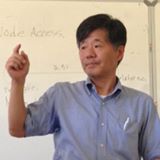Mr. Murakami was a president of Google Japan and a vice president of Google headquarters. He said that he had not be able to speak English and he started study English when he was thirty, moved on American computer company. It's the first time for last ten years I bought this kind of book, How-to-English book.
He said first in his book, you'd better to read English books without dictionary and aim to read one million words. I really think so, and I did it already.
Second, he said about vocabulary building. His way is just glance words. He recommend some vocabulary books which has over ten thousand English word list for leaners. You'd better to glance all of them everyday. Upps, It's sound very tough. You need over a couple of hours a day. But he said he had done it.
The most interesting of his ways is how to deal with when you meet a word you don't know. He said almost all difficult English word is adjective or adverb. You can understand English sentences if you know noun and verb well without adjective or adverb. And adjective and adverb have only two type, good or bad. If you meet unknown word, and it is adjective or adverb, you can change the word good or bad in your mind.
For example, you read "He was tall and languid, with longish blond hair, a deep tan, pale blue eyes, and a diamond in his left ear."
There is no difficult word but "languid". According to a dictionary, languid is "lazy and involving very little activity". You can change this to "bad".
"He was tall and bad, with longish blond hair, a deep tan, pale blue eyes, and a diamond in his left ear." It' no problem for you to follow the sentence. How do you think so?




